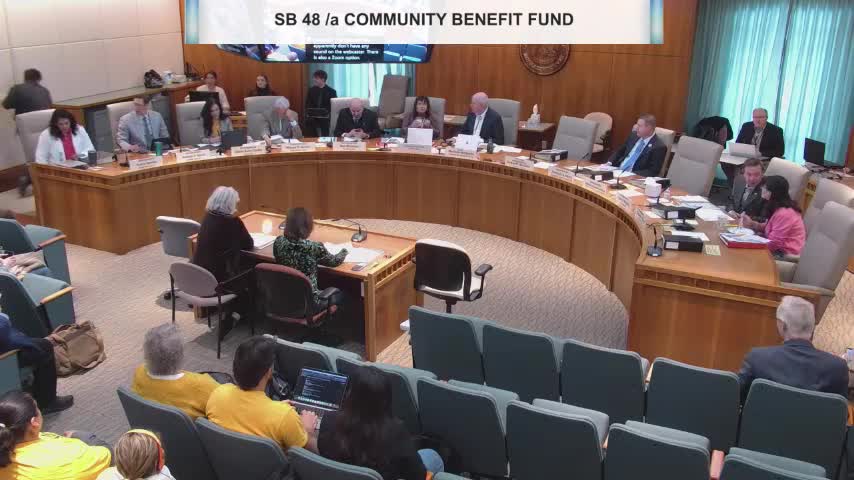House committee advances $340 million community benefit fund for climate, workforce and infrastructure projects
Get AI-powered insights, summaries, and transcripts
Subscribe
Summary
A House committee advanced Senate Bill 48, a proposal to route hundreds of millions to climate adaptation, grid modernization, workforce training and electric-vehicle infrastructure with requirements to work with so-called overburdened communities and annual agency reporting to interim legislative committees.
A House committee voted to advance Senate Bill 48, a proposal that would direct a large, nonrecurring state appropriation into grants for grid modernization, electric school buses, workforce training and other projects intended to help communities prepare for climate change.
The bill, discussed at length by committee members, public commenters and agency staff, would route funds through existing state agencies and requires applicants to demonstrate work with “overburdened communities” either by holding two public meetings in the affected community or by producing a negotiated community benefits agreement. The bill also requires annual reports from administering agencies to interim legislative committees, the sponsor said.
The sponsor described a range of potential projects that could seek grants, including weatherization for low-income households, pedestrian and bridge repairs after flood events, grid upgrades and a range of workforce programs. “The grid modernization is key,” the sponsor said, noting the Energy, Minerals and Natural Resources Department (EMNRD) would administer many grants.
Supporters at the hearing included labor and community organizations and state staff. Travis Kellerman, senior climate advisor to the governor, said the bill “supports both adaptation and mitigation” and would create apprenticeships and economic opportunities tied to clean-energy projects. Ata Chavis of NM Native Vote emphasized tribal needs: “Our tribal communities are facing the most outsized impacts of the global climate crisis,” Chavis said, and added that the fund could support traditional land stewardship, water projects and renewable energy on tribal lands.
Opposition came from industry representatives worried about funding sources. Jim Winchester of the Independent Petroleum Association of New Mexico told the committee the bill was “respectfully opposed,” saying the package relies substantially on oil-and-gas revenue while including measures that transition away from fossil fuels.
Committee members pressed the sponsor on several operational points: how the bill will define and implement an “overburdened communities” data tool, how agencies will rank and prioritize projects across multiple funds, and whether the funding would create permanent local jobs. The sponsor and staff said the bill directs the Department of Finance and Administration (DFA), in consultation with EMNRD, to develop or identify a geospatial data tool (similar to a tool previously offered by the U.S. Environmental Protection Agency) to identify communities experiencing disproportionate burdens across climate, health, housing, legacy pollution and other axes. The sponsor said the tool would incorporate tribal and indigenous datasets.
Committee members also sought detail on amounts and durability of funding. The sponsor said the proposal started as a roughly $340 million package and that portions were adjusted in the budget process; she described the funds as nonrecurring seed money over a two-year implementation window but said successful elements could be proposed again in future budgets. The sponsor also said the bill includes an annual evaluation requirement for administering agencies.
Concerns about equity and guardrails surfaced repeatedly. Representative Montoya asked how the bill would prevent larger urban projects from capturing most grants; the sponsor said the overburdened-communities requirement and agency oversight, plus required reporting to interim committees, are intended to produce geographically distributed awards. Several members said they wanted clearer ranking criteria to compare projects across agencies.
The committee accepted public testimony from local groups and businesses and held extended questioning from members. After debate, the committee recorded a roll-call vote to advance the bill from committee.
The bill advances with committee direction that agencies report annually to legislative interim committees on program outcomes and project distribution.
Votes at the committee recorded in the transcript included recorded individual votes by members present. The roll call in the hearing record shows at least five recorded yes votes (Representative Dixon; Representative Garcia; Representative Carolla; Representative Small; Representative Beto) and at least four recorded no votes (Representative Henry; Representative Montoya; Representative Murphy; Representative Senna Cortez). The committee sponsor and staff said the bill would be implemented through appropriations language placed in the omnibus budget bill (House Bill 2) and distributed by DFA to designated agencies.
